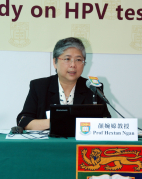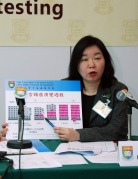Media
HKU study finds women in HK hold positive attitude to HPV testing
12 Jul 2012
High risk human papillomavirus (HPV) infection is the cause of cervical cancer. The Department of Obstetrics & Gynaecology at the University of Hong Kong Li Ka Shing Faculty of Medicine conducted a study on HPV infection and noted that local Chinese women were overwhelmingly positive about HPV testing. However, the study also found that many local women had inadequate knowledge and false beliefs about HPV and HPV testing such as promiscuity implication, leading to stigmatization and hence, a possible deterrent to cervical cancer screening.
In addition, a study by the Department of Pathology, HKU, shows that 56% of the 10,000 local women diagnosed with ASC-US (atypical squamous cells of undetermined significance, the most common abnormal cytological finding encountered in cervical cytology screening) in screening smears, were positive for high risk HPV. Women with ASC-US and positive for HPV should be identified as high risk group for having cervical cancer (20 times higher in relative risk when compared with women with ASC-US but negative for HPV DNA test) and they should be referred for colposcopy directly without waiting for repeat smears. In the long run, HKU will further investigate whether HPV testing can be a first-line screening tool, co-testing with smear or directly using HPV DNA test, to improve the accuracy of cervical screening in Hong Kong.
About HPV infection
HPV infection is very common in both men and women. It has been estimated that the lifetime chance of HPV exposure for any sexually experienced individuals could be as high as 50-80%. People who are infected with HPV are unaware of it for there are no symptoms, and most infections disappear on their own. However, if an infection persists, it may lead to cervical cancer.
HKU’s research on women’s perception and acceptance of HPV/ HPV testing
In 2009, with the support by the Department of Obstetrics & Gynaecology, HKU conducted a randomized controlled trial to study local Chinese women’s perception towards HPV and HPV testing, and whether they would accept this new measure. Nearly 300 women who attended The Family Planning Association of Hong Kong (FPA) Wanchai clinic joined the study. Each was asked to read an educational message about HPV and HPV testing. Self-administered questionnaires were used to measure women’s responses before and after reading the message. The response to HPV testing was overwhelmingly positive, with over 90% of the participants indicating their willingness to get tested for HPV at both points of measurement.
On the other hand, such enthusiasm may carry a caveat of potential harms as we learnt that most of the women in the study had inadequate knowledge and false beliefs about HPV and HPV testing. Before reading the educational message, 41% of the participants had never heard of HPV before. The mean score of women’s knowledge about HPV and cervical cancer was only 1.5 out of a total of 6. The most common false beliefs were: (1) HPV infection implicated promiscuity (agreed by 22%); (2) A woman got infected because she had more than one sexual partner (agreed by 22%); and (3) HPV infection indicated their partners have been unfaithful (agreed by 17%). Such misconceptions may cause women harm. Individuals who have a positive HPV test may be stigmatized by others, or they may incur undue psychosocial burden on themselves. Women who are not tested may avoid cervical screening altogether for fear of stigmatization.
HPV testing
With the support by SK Yee Medical Foundation, The Department of Pathology, HKU Li Ka Shing Faculty of Medicine provided reflex pooled high risk HPV DNA test (to test the presence of 14 genotypes of HPV in one go) for about 10,000 women diagnosed with ASC-US in screening liquid based cervical cytology in FPA clinics from 2007 to 2012. Since over 70% of cervical cancer is caused by HPV 16 and 18, genotyping of HPV 16 and 18 was further performed in 1,700 cases using cutting edged automated platform.
Among the 10,000 tested cases, about 56% were positive for 14 types of high risk HPV. Follow up data showed that women diagnosed with ASC-US in cervical cytology sample and positive for HPV were statistically more likely (p<0.001) to have high grade cervical intraepithelial lesion (HSIL/ CIN 2-3) detected in subsequent follow up samples, their relative risk is 20 times higher than those women with ASC-US but negative for HPV. The sensitivity and negative predictive value (predict the possibility of not developing cervical lesions) of the pooled HPV DNA tests approach 100%, although the specificity is lower. The specific identification of HPV 16 or 18 genotypes further increase the specificity and positive predictive value (predict the possibility of developing cervical lesions) of identifying cases which harbour HSIL/CIN2-3, the risky precancerous lesion.
In the past, women with ASC-US will be followed up with repeat smear in 6 months before going further for colposcopy for a more in-depth checkup. Since previous studies including trials in collaboration with HKU have shown that HPV DNA test is sensitive in detecting cervical lesions, FPA adopted the practice since 2007 that women with ASC-US and positive for HPV will be referred for colposcopy without waiting for repeat smears. Women who are negative for HPV DNA test are classified as lower risk and there is no urgent need for them to be followed up with repeat smear in 6 months, but in one year later instead. The above mentioned retrospective analysis confirmed the significant implication of HPV testing in local population. Such data further emphasize women with ASC-US and positive for HPV are at higher risk for having cervical cancer. Therefore the practice of referring these women in high risk group for colposcopy is strongly advisable and should be further promoted in Hong Kong.
Continued research effort at HKU
The research team at HKU is currently conducting a study on HPV DNA testing with an aim to investigate whether the use of HPV testing as a first-line screening tool (co-test with smear) will improve cervical screening accuracy in Hong Kong. Participants of the study will receive a free HPV test when they have their Pap smear test at the designated clinics of the Family Planning Association of Hong Kong. Ethnic Chinese women aged 30 to 60 years are welcomed to join. Details of the study and eligibility are available at the clinics or on our website: http://www.obsgyn.hku.hk/ . Interested parties may enquire at 2255 4265.
Public education for HPV
Professor Hextan NGAN Yuen-sheung, Tsao Yin-Kai Professor in Obstetrics and Gynaecology, Clinical Professor and Head of the Department of Obstetrics and Gynaecology, The University of Hong Kong Li Ka Shing Faculty of Medicine remarks, “HPV testing may increase screening accuracy and provide better guidance for follow-up management. Mass HPV education needs to go hand-in-hand with widespread testing in Hong Kong. Government and healthcare professionals should proactively inform the public about HPV and the new screening strategies. The contents of such information should target and correct misconceptions and be culturally appropriate, aiming at education without stigmatization.”
About the Research Team
The study on women’s acceptance and perceptions on HPV was conducted by The Gynaecologic Oncology Research Team, which is a multidisciplinary team headed by Professor Hextan NGAN Yuen-sheung with members from Department of Obstetrics and Gynaecology, Department of Pathology, Department of Psychiatry, Department of Community Medicine, HKU and the Family Planning Association of Hong Kong. Professor Annie CHEUNG Nga-yin, Clinical Professor of the Department of Pathology, headed the study on HPV testing supported by the SK Yee Medical Foundation.
About AOGIN conference
In the next three days (July 13-15, 2012), international experts including Professor Harald zur Hausen, who was awarded the Nobel Prize in Physiology or Medicine in 2008 for his discovery of HPV causing cervical cancer, will attend the 5th biennial AOGIN (Asia-Oceanic Research Organisation in Genital Infection and Neoplasia) conference, organised by Department of Obstetrics and Gynaecology, The University of Hong Kong Li Ka Shing Faculty of Medicine, to address issues on prevention and control of cervical cancer. We hope that this would benefit not only to women in Hong Kong but also the rest of the world.
(From left) Professor Harald zur Hausen, Recipient of Nobel Prize in Physiology or Medicine in 2008, Professor Hextan NGAN Yuen-sheung, Tsao Yin-Kai Professor in Obstetrics and Gynaecology, Clinical Professor and Head, Department of Obstetrics and Gynaecology, The University of Hong Kong Li Ka Shing Faculty of Medicine, Ms FAN, a patient who recovered from early stage of cervical cancer and Professor Annie CHEUNG Nga-yin, Clinical Professor, Department of Pathology, The University of Hong Kong Li Ka Shing Faculty of Medicine
Professor Annie CHEUNG Nga-yin, Clinical Professor, Department of Pathology, The University of Hong Kong Li Ka Shing Faculty of Medicine explains the cervical cancer progression.



